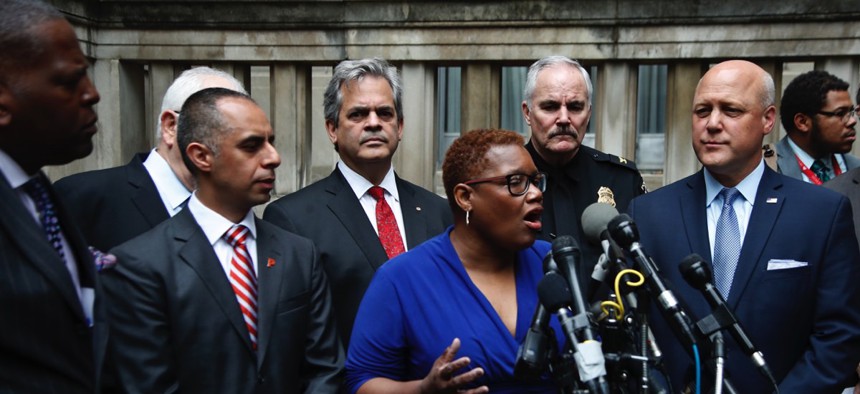Local Government Officials Buck ‘Big Six’ Tax Reform at the Expense of SALT

Gary, Indiana Mayor Karen Freeman-Wilson, center, speaks before a delegation from the U.S. Conference of Mayors in April 2017. Manuel Balce Ceneta / AP Photo

Connecting state and local government leaders
With the GOP’s new tax plan the state and local tax deduction many jurisdictions rely on is on the chopping block, prompting concerns about future “double taxation.”
WASHINGTON — Local government officials balked at the broad “Big Six” tax plan released Wednesday, namely its proposed elimination of the state and local tax deduction and others viewed as critical to fiscal viability.
The Big Six—consisting of Treasury Secretary Steven Mnuchin, House and Senate leadership, both bodies’ tax-writing committee chairs, and National Economic Council Director Gary Cohn—wants to cut the corporate tax rate from 35 to 20 percent and condense tax brackets from seven down to three.
Such large tax breaks are expensive and would cost an estimated $1.5 trillion the first year and $5 trillion in 10, making the state and local tax deduction, commonly called SALT, a potential casualty in the attempt to offset that deficit.
“We have been unequivocal in our opposition to the removal of the SALT deduction,” Mayor Karen Freeman-Wilson of Gary, Indiana told Route Fifty in an interview, referring to the U.S. Conference of Mayors’ visit to Capitol Hill this week. “We believe that it is tantamount to double taxation and very devastating to growth in communities.”
A person’s income would be taxed twice at the state-local and federal levels should SALT be done away with, and, as a result, jurisdictions would have a tougher time selling residents on future tax increases to fund things like public safety services, local government advocates argue.
The proposal calls for nearly doubling the standard deduction for couples to $24,000, but taking away the ability to obtain itemized deductions, particularly in places with high property taxes, could represent a net loss. That loss might be as much as $800 out of the pockets of middle-income families in many states, Freeman-Wilson said.
“This is not a red versus blue issue, and this is not a coastal-cities versus the heartland-cities issue,” said Cleveland Councilman Matt Zone, National League of Cities president, in a statement. “Eliminating these deductions would be an ill-advised attempt to change the basic intergovernmental relationship that has existed and served American cities and families well since the first tax code was introduced in 1913.”
Local officials are not without optimism however, as congressional Republicans are understood to be acting in accordance with regular legislative procedures—rather than forcing tax reform through like they attempted with health care. Mayors expect an opportunity to weigh in, though they understand the stakes are high.
SALT is a $1.3 trillion quick fix, Freeman-Wilson said, but it won’t cover the entire plan.
“There did seem to be more Republicans who were willing to indicate that SALT was disposable,” the Democratic mayor said. “They seemed to be of the mind that it wasn’t a big deal; it’s not widely used.”
One such representative USCM met with this week threw out a statistic only 8 percent of individuals would be impacted by SALT’s nixing.
“We thought that was an odd number, and we are going to do the math,” Freeman-Wilson said.
That’s an easier task now that the Big Six proposal is out.
Both USCM and NLC agree the current tax code is too complex and tax rates could be lowered but not at the expense of SALT or the federal tax exemption for municipal bonds, which protects the interest cities earn on such loans—often taken out to finance infrastructure projects.
“All of the mayors affirmed their commitment to seeing the tax code reformed,” Freeman-Wilson said. “The question is: Who pays for it?”
County-level officials have raised concerns, too.
“While we share the goals of kick-starting the national economy and reducing federal deficits, the reality of this proposal doesn’t match the rhetoric," said National Association of Counties Executive Director Matthew Chase in a statement. "We can’t achieve these goals by forcing residents to pay taxes on their taxes."
Dave Nyczepir is a News Editor at Government Executive’s Route Fifty and is based in Washington, D.C.

NEXT STORY: Q&A: An Oregon Mayor Talks Tax Reform and DACA on Capitol Hill





